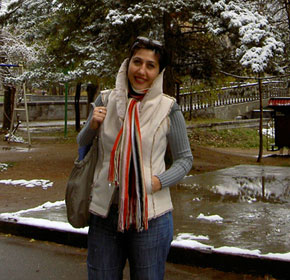A lot of negotiations, some meetings, but no results. This is how the process of resolving the Nagorno-Karabakh conflict in 2010 can be characterized, reports the Azerbaijani service of the BBC. OSCE Minsk Group flights to Baku, Yerevan and Stepanakert last year were fruitless.
Karine Ohanyan is a journalist born in Stepanakert who has since moved to Yerevan; however, she makes frequent trips to the de-facto republic. She talks about life in Nagorno-Karabakh.
-What’s important for me is not some particular event. This year [2010], the crossfire on the Line of Contact was greater than in the past. There was even talk of war. But despite the talk, there was no war. Already, this is a very important event for Nagorno-Karabakh. With regard to peaceful negotiations, they are ongoing. True, there were many deaths, but it was not a war.
How does this tension affect life in Nagorno-Karabakh?
-Since Nagorno-Karabakh is a small area, news of any event spreads faster here than in the press. Friends, relatives call each other, and so the tension increases.
The war still lives on in memory. And the tension is always there. So, whatever people may be doing, in one part of the brain the thought of the possibility of war is always there. The threat of war seems to hang over people’s heads. And this, unfortunately, doesn’t give people the opportunity to think about the future. They think only of what might happen tomorrow — not even what might happen the next day.
Let’s talk about you. What was the most significant event for you in 2010?
-This year I got married and moved to Yerevan. And the whole year I spent becoming accustomed to life in Yerevan. It’s amazing. I used to think that the Armenians of Karabakh and the Armenians of Armenia differed little from each other. But the more I live in Armenia, the more I understand that we are very different. And I understood that over the course of one year.
I also noticed that in Armenia, people are not that informed about Karabakh. And Karabakh people know very little about Armenia. For me, it was integration.
Very interesting. What distinguishes the Armenians of Armenia to those of Karabakh?
-To understand exactly is very difficult. A different mentality. But this is not such a small difference. I don’t know. Maybe the war has changed people in Nagorno-Karabakh? They have become more gloomy. This is also palpable in their conversations with each other.
In Armenia, people speak politely, but they can be rough with you. But in Karabakh, people can speak more openly and even rudely, but in reality, they wouldn’t act rough toward another.
I would never know these details if I had not lived in Armenia. And there’s another difference: the view of the future. Armenians of Armenia and those of Karabakh view the future differently.
How did you acclimatize to your new life?
-I got used to it, but I continue to think that living in Nagorno-Karabakh is more convenient and calm. The air is clean, the products in the market likewise, though there is always tension. However, the overall rhythm of life in Karabakh is more positive.
Photos: BBC
 Epress.am News from Armenia
Epress.am News from Armenia
